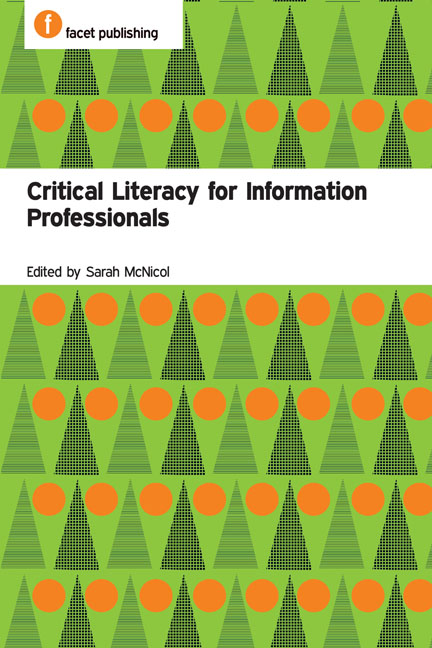Book contents
- Frontmatter
- Contents
- Contributors
- Introduction
- PART 1 THEORIES OF CRITICAL LITERACY
- PART 2 CRITICAL LITERACY IN PRACTICE
- 8 A picture is worth a thousand words: teaching media literacy
- 9 Curricular and extra-curricular opportunities to engage school students in critical literacy in England
- 10 New media and critical literacy in secondary schools
- 11 Critical literacy and academic honesty: a school librarian's role and contribution
- 12 Engaging undergraduate communications students in critical information literacy
- 13 Exploring pedagogical implications of students’ search mediation experiences through the lens of critical information literacy
- 14 Diffusing critical web literacy in a teacher-education setting: initial reflections and future planning
- Further information
- Index
12 - Engaging undergraduate communications students in critical information literacy
from PART 2 - CRITICAL LITERACY IN PRACTICE
Published online by Cambridge University Press: 08 June 2018
- Frontmatter
- Contents
- Contributors
- Introduction
- PART 1 THEORIES OF CRITICAL LITERACY
- PART 2 CRITICAL LITERACY IN PRACTICE
- 8 A picture is worth a thousand words: teaching media literacy
- 9 Curricular and extra-curricular opportunities to engage school students in critical literacy in England
- 10 New media and critical literacy in secondary schools
- 11 Critical literacy and academic honesty: a school librarian's role and contribution
- 12 Engaging undergraduate communications students in critical information literacy
- 13 Exploring pedagogical implications of students’ search mediation experiences through the lens of critical information literacy
- 14 Diffusing critical web literacy in a teacher-education setting: initial reflections and future planning
- Further information
- Index
Summary
Introduction
It has been over a decade since Troy Swanson (2004) published his ‘radical’ idea that librarians should teach students about information itself, including how and why it is created, and not just how to search for it. Critical literacy provides the information professional with an opportunity to encourage critical consciousness in students (Elmborg, 2006; Kopp and Olson-Kopp, 2010) and to examine the social context and construction of information sources (Kapitzke, 2003). Beyond good or bad sources, critical information literacy encourages students to ascertain the social and cultural frameworks in which the information was created and understand the implications of that context. This chapter discusses the way in which a librarian and an instructor collaborated to engage undergraduate students in a required undergraduate communications course in critical information literacy. It starts, however, with a consideration of how a lack of published examples can present a challenge to librarians wishing to implement critical information literacy approaches.
Examples of critical information literacy in libraries
Critical information literacy is rooted in the work of critical theorists and, more specifically, the critical pedagogy of Paulo Freire. In his Pedagogy of the Oppressed, Freire (2000, 72) explicitly relates several traditional library functions – receiving, filing, collecting, storing, cataloguing – to his ‘banking concept of education’ in which teachers view knowledge as capital to be deposited in students. Elmborg (2006, 193) asks how librarians should respond to Freire: ‘Is the library a passive information bank where students and faculty make knowledge deposits and withdrawals, or is it a place where students actively engage existing knowledge and shape it to their own current and future uses?’ The literature suggests that many librarians have since endeavoured to make the library a place of engaged learning and knowledge construction (Bruce, 2004; Mackey and Jacobson, 2010; Maybee, 2006). Elmborg (2012, 90) notes that Freire's critical pedagogy responded to a specific cultural and philosophical context and that, before appropriating it as a pedagogical model, librarians must ‘account for the translation of his work … into modern (and postmodern) practices’. The influx of ideas and praxis from critical pedagogy has helped librarians to transition from resource-based bibliographic instruction to user-centred information literacy.
- Type
- Chapter
- Information
- Critical Literacy for Information Professionals , pp. 129 - 138Publisher: FacetPrint publication year: 2016



